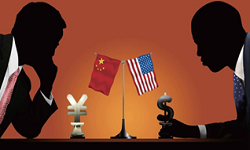

Context
- Recently, the United States has stated that it is switching from decoupling to de-risking in its approach to China.
Key highlights:
- The Trump-era focus of the U.S. to decouple from China is being phased out by a new concept.
- The U.S. has expressed that it is shifting its policy on China from decoupling to de-risking.
- The EU has already declared that its approach to China will be based on de-risking.

What is ‘de-risking’?
- United States administration stated that “decoupling” has been changed to “de-risking”.
- De-risking: According to the U.S. National Security Advisor, “de-risking fundamentally means having resilient, effective supply chains and ensuring we cannot be subjected to the coercion of any other country”.
- Objective: De-risking aims to limit such an effect only in areas where it undercuts the national security and industrial competence of the U.S.
- Decoupling: It stands for an eventual reversal of the four-decade old project to enmesh the two economies.
When the U.S. and China diplomatic ties established?
- After the establishment of diplomatic ties between the S. and China in 1979, both the countries embarked on a path of increasing economic interdependence.
- China gained immensely from this relationship, as it helped the country drastically widen and deepen its diplomatic and economic engagement with the rest of the world.
- As China’s economic and military power grew, its ambition to challenge the primacy of the U.S. in the international system became increasingly apparent.
- China’s rise not only came at the expense of America’s global clout, but also the latter’s domestic industry, which got “hollowed out” in its four-decade old economic embrace with China.
Why de-risking?
In order to understand the rationale behind the U.S.’s shift from decoupling to de-risking because:
- Disruption of global economy: The world has just emerged out of the tentacles of the pandemic after three disruptive years and the global economy is hoping for a resulting rebound.
- Tensions on Taiwan Strait: The U.S.-China rivalry had peaked in the past few months due to tensions across the Taiwan Strait as China also witnessed Xi Jinping beginning his second decade of rule over China in an unprecedented third term as the General Secretary of the Communist Party of China.
- Acrimonious Spy balloon: According to the Biden Administration, the balloon was “part of a larger Chinese surveillance-balloon program,” which the White House argued had violated the sovereignty of nations all over the world.
- Russia-China closeness against West: China and Russia are taking center stage this week as both countries look to deepen ties just as a chasm with the West, on a geopolitical and economic as well as military front, appears to be getting deeper, according to analysts.


